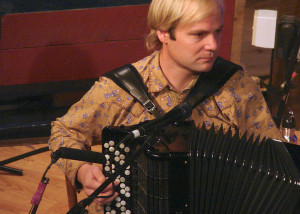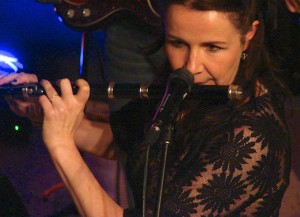I headed off for this mid-week show with expectations that were not very high. Just goes to show how wrong you can be! By the end of the night, nay by the midpoint, it had become my favorite memory (so far) of the 17th annual Celtic Colours International Festival.
First, the venue. The Louisbourg Playhouse is located in historic Louisbourg (the English-speaking Canadians here say “lewis-burg”) is a very intimate theater, all made of wood with the audience seated on three levels in the round — great sightlines, good lighting and warm but bright sound. It’s situated right by the water in this old fortress city that is celebrating its 300th anniversary this year, so the ambient sounds and smells were all redolent of the seaside. And this was the only venue we’ve been to so far this time that served alcohol; beer and wine were available before the show and during intermission, and also during intermission there were free refreshments — the ubiquitous local snack of oatcakes and hot tea. The show was sold out for the theater’s approximately 200 seats.
The opening act was a Swedish duo making their Celtic Colours debut, Hazelius Hedin, named for its two members, both well-known folk musicians in Sweden. Esbjöorn Hazelius plays guitar and bouzouki and sings with a warm, strong baritone; Johan Hedin plays the Swedish national instrument the nykelharpa and sings harmonies. Hedin also makes nykelharpas and composes music for it, and enjoys exploring the intersection of folk and other music traditions. The two had arrived in Nova Scotia at about 4 a.m. that day after a 30-hour trip from Sweden (along with fellow musicians in another Swedish group, the dynamic trio Väsen, whom we saw at that morning’s CBC Mainstreet Live program at the Knox Church in Baddeck). Nonetheless, they played a fine introductory set of polskas and songs to which the crowd responded warmly. Particularly impressive was a folk song set to a traditional hymn’s melody on which Hedin bowed and plucked a large nykelharpa whose tone was close to that of a cello.
In the program’s second slot was a new international group, Snowflake Trio. It is anchored by Glasgow-based Irish singer and flautist Nualla (NOO-la) Kennedy and rounded out by two Norwegians, jazz accordionist Frode Haltli and hardanger fiddler Vegar Vårdal. These three are really pushing the boundaries of traditional music, blending Celtic and Nordic folk music played on traditional instruments with elements of jazz, post-modern classical and whatever else they pull out of their bag of tricks. I was totally smitten almost from the first note, which came in a slow, dramatic build-up to the trad Irish piece “The Butterfly.” After a fiddle tune “The Lost Sheep” from Kennedy’s hometown of Dundalk (which has historically strong Scottish ties) Kennedy showed off her lovely soprano voice on a mournful slow air. They also played one comically complex tune with lots of modernist classical elements in it, a dramatic waltz composed by Haltli, and a set of two tunes from Brittany, including one very fast waltz with elements of Parisian bal musette. Here’s “A Face For Scuba,” a tune that they recorded at the Gaelic College in Cape Breton Island while there for Celtic Colours.
The audience may not have been accustomed to such a blend of modern and traditional, but they seemed to appreciate it either way. But most of them seemed to be there for the headliners, the rocking young ensemble Sprag Session whose frontman, fiddler Colin Grant, hales from just down the road in Membertou. And they truly shook the house with their driving, rhythmic brand of rock-n-reel music. The group originally was a trio of Grant with multi-talented string player Darren McMullen and pianist Jason Roach, but have since added bassist Donnie Calabrese and drummer Merlin Clarke, and they’ve rocked halls and festival stages around the world over the past couple of years. Grant is a superb, rubber-faced frontman and a bouncing ball of energy, not to mention a superb fiddler grounded in the Cape Breton tradition. McMullen played some knock-out solos on both guitar and mandolin, and Roach’s piano stylings ran the gamut from Cape Breton dancehall to Jerry Lee Lewis rock ‘n’ roll to ’70s-style prog rock. Kennedy joined in on a swinging song called “The New Yorker,” and they wrapped up things with a song named for what Cape Bretoners say when they know you’re pulling their leg: “Gwanwitcha.” None of my photos can do it justice, and neither could any video I could take, so here’s their official video for the song. Enjoy, and trust me the live version was not nearly this sedate:
(Louisbourg, Cape Breton Island, Nova Scotia, October 16, 2013)


